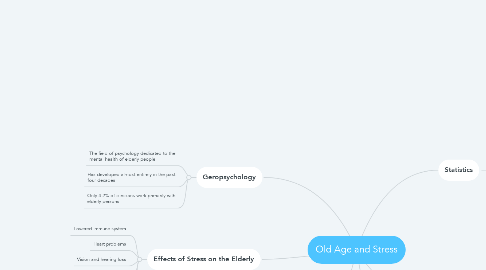Old Age and Stress
by Sydny Ridgeway


1. Geropsychology
1.1. The field of psychology dedicated to the mental health of elderly people
1.2. Has developed almost entirely in the past four decades
1.3. Only 4.2% of clinicians work primarily with elderly persons
2. Effects of Stress on the Elderly
2.1. Lowered immune system
2.2. Heart problems
2.3. Vision and hearing loss
2.4. Digestive issues
2.5. Dental issues
3. Signs and Symptoms of Stress in the Elderly
3.1. Feeling tired
3.2. Sleeplessness
3.3. Irritability
3.4. Unnecessary worrying
3.5. Headaches and other pains
3.6. Negative feelings or attitude
3.7. Feeling out of control
3.8. Poor concentration
3.9. Frequent crying
3.10. Constipation or diarrhea
3.11. Shortness of breath
4. Statistics
4.1. Old age=past age 65
4.2. 46 million in the US are "old"
4.3. Old women outnumber men, 3 to 2
4.4. Over half of adults over 65 have more than one chronic illness
4.5. About half of the elderly have insomnia or sleep problems
5. Causes of Stress
5.1. The loss of a spouse, friend, and adult children
5.2. The loss of former activities and roles
5.3. The loss of hearing and vision
5.4. Most lose their sense of purpose after they retire
5.5. General stress due to aging
5.5.1. More than 20% of elderly people meet the criteria for a mental disorder
5.5.2. As many of half of all elderly people would benefit from some degree of mental health services
5.5.3. Fewer than 20% actually receive mental health services

